Most known for his OBEY series that began with imagery of Andre the Giant in a sticker campaign, Frank Shepard Fairey (now goes by Shepard Fairey) first began his career with skateboard designs. Fairey was born in February of 1970 in Charleston, South Carolina. As a young teen Fairey was inspired by the works of Andy Warhol and Keith Haring, the young artist jumpstarted his career when he began to design and sell skateboards and T-shirts (Britannica). In 1988, Fairey graduated from the Idyll Wild Arts Academy in Palm Springs, California. Shortly after graduating, Fairey launched his sticker campaign in 1989. Most notable of the collection was his Andre the Giant Has a Posse design, which soon became the foundation for the later OBEY series (artsy). Within four years of graduating Idyll Wild Arts Academy, Fairey earned his B.F.A from the Rhode Island School of Design in 1992. Fairey’s passion to design and sell his work grew through the founding of OBEY clothing in 2001. In collaboration with Urban Outfitters, Fairey designed caps, shirts, and other apparel for his clothing line to be sold in UO stores. By 2008, Shepard Fairey further attracted the public through his HOPE poster. Finally, in 2009 he had his first solo exhibition Supply & Demand held at the Institute of Contemporary Art in Boston. Today, Fairey’s works are in collections at the Smithsonian (Washington, D.C.), the Los Angeles County Museum of Art, and the Victoria & Albert Museum in London.
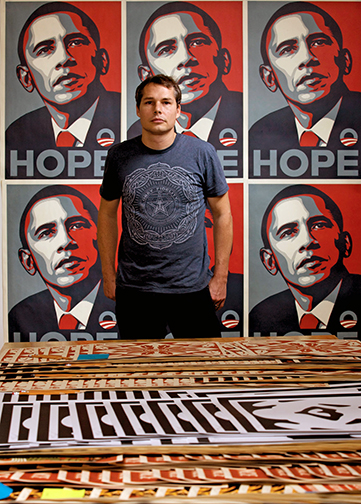
Fairey often expresses his political beliefs through his work. In 2017, Fairey responded to the xenophobic language presented by president-elect Donald Trump through his production of three posters that portrayed a culturally diverse group of women painted in red, white, and blue color scheme. Another example is Fairey’s portrait of Trayvon Martin to which he created for Ebony Magazine in 2012. Fairey further protested racism in 2016 with his poster series “We the People” that illustrated minority women as the subjects. Other major works by Fairey are his Peace Elephant (2011) and Purple Project (2014). Fairey’s progressive street style has earned him his current fame. According to Wide Walls Magazine, Shepard Fairey’s estimated net worth (as of 2014) is roughly $15 million.
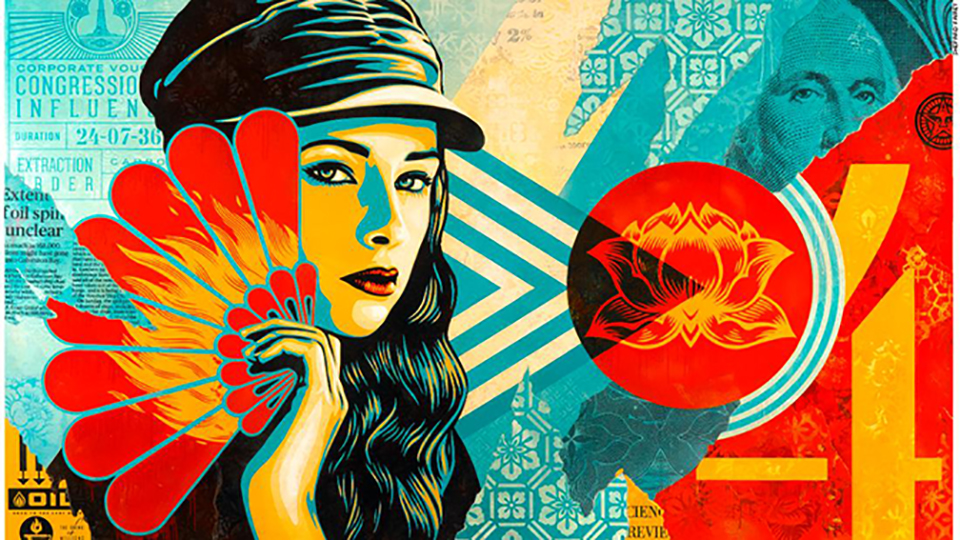
In a 2004 interview with Steven Heller of the Professional Association for Design, Fairey acknowledges the astounding promotion received when his sticker campaign hit it off with the public. “The fact that a larger segment of the public would not only notice, but investigate, the unexplained appearance of the stickers was something I had not contemplated” (Heller, 2004). Fairey shares that the recognition sparked his interest in producing a large image, however he did not believe he’d amass views outside of Providence, Rhode Island (Heller, 2004). Fairey’s sticker campaign soon spread to other cities and became a symbol of rebellion to corporations. “The stickers were a rebellious wrench in the spokes, a disruption of the semiotics of consumption” (Heller, 2004). In addition, Fairey did not intend for his Obey Giant to stand as a political mark. The artist shares that he inspires people to question everything, including the images they see in everyday life.
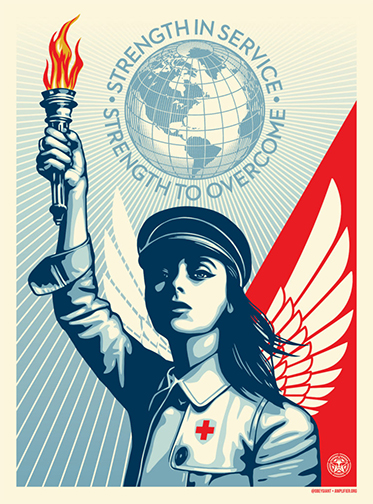
Courtesy Amplifier.
Although Fairey did not intend for his art to speak from a political platform, his current work expresses his political beliefs, as mentioned earlier. Recently, Fairey and artists Jenny Holzer and Luchita Hurtado collaborated in the launch of Artists Band Together, a bandana campaign aimed towards U.S. citizens in efforts to increase voter turnout for the 2020 elections (Aziz, 2020). The campaign teamed with eBay to provide limited-edition pieces that displayed artwork by Fairey, Holzer, and Hurtado with all proceeds donated to educational and supporting programs aimed towards voters. In a recent interview with Forbes, Fairey shared his view of the younger generation and their relationship with politics:
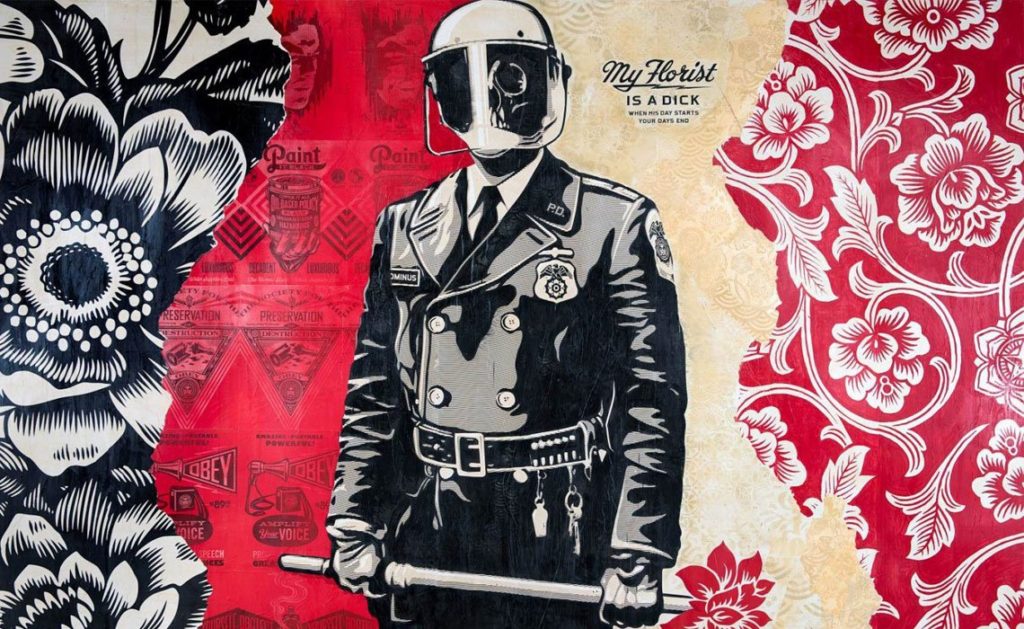
“But just in general, even seeing all the homemade signs, graphics and things that activists have been making, it shows me that there’s a huge amount of creative talent and energy from younger people that I didn’t see for example during the Iraq war or any number of the other things that have come along” (Aziz, 2020).
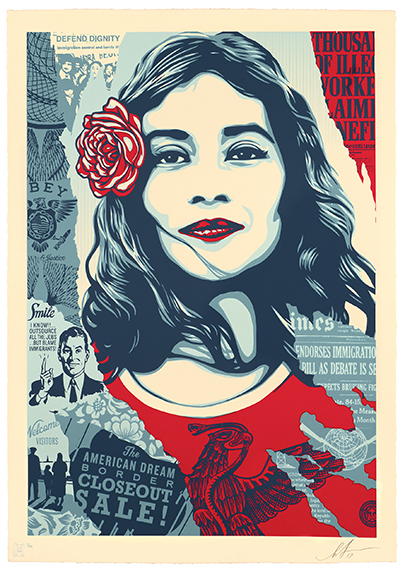
Fairey continues to release his art in alignment with his political views. His recent works are Justice Woman – released March 13, 2021— and The High Cost of Free Speech, released March 5, 2021. These two artworks are just a small sample from Fairey’s routine publishing each month. More of his work can be viewed and purchased at the Obey Giant website. Fairey is actively involved in the political sphere and is expected to continue expressing his beliefs through his art.
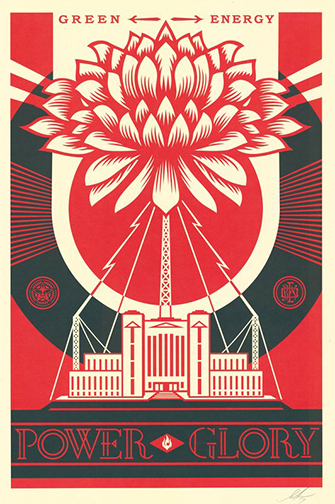
For additional information on the art, design and social activism of Shepard Fairy, please check out:
Soldout – https://soldoutposters.com/collections/shepard-fairey
Widewalls – https://www.widewalls.ch/artists/shepard-fairey/artworks
Obey Giant – https://obeygiant.com/
AIGA – https://www.aiga.org/interview-with-shepard-fairey-still-obeying-after-all-these-year
New York Times – https://www.nytimes.com/2017/11/03/arts/design/shepard-fairey-damaged-chinatown.html
Washington Post – https://www.washingtonpost.com/news/local/wp/2017/01/20/the-artist-who-created-the-obama-hope-posters-is-back-with-a-new-art-this-inauguration/
Los Angeles Times – https://www.latimes.com/entertainment/arts/et-la-0323-fairey-pg-photogallery.html
Essay written by Veronica Navarette, a senior graphic design major who couples interests in late 1990s to early 2000s Grunge aesthetics with quintessential design standards. In addition, Navarette is a member or the Women’s Track and Cross Country teams. In 2021, USF’s lady runners won their first NAIA National Championship!
© All art and design copyright Shepard Fairey, all rights reserved.


